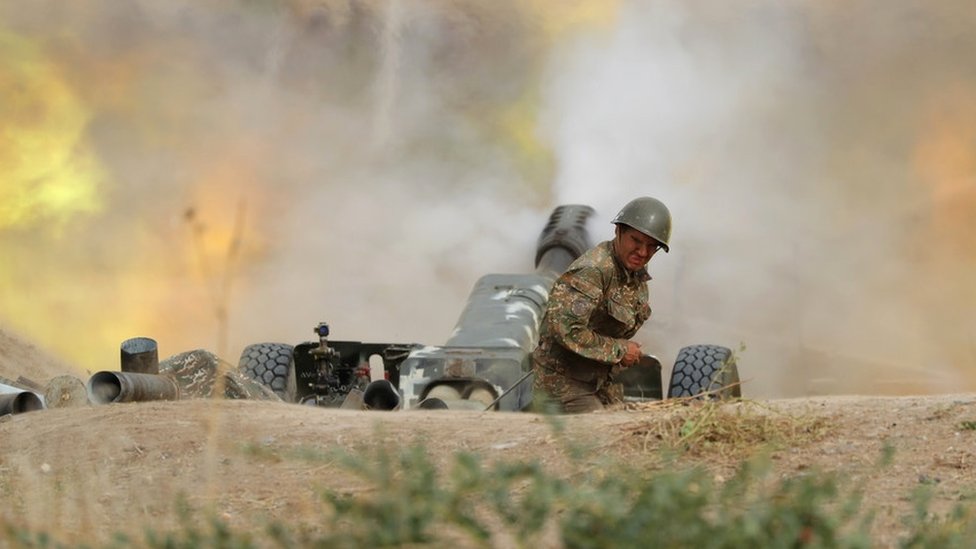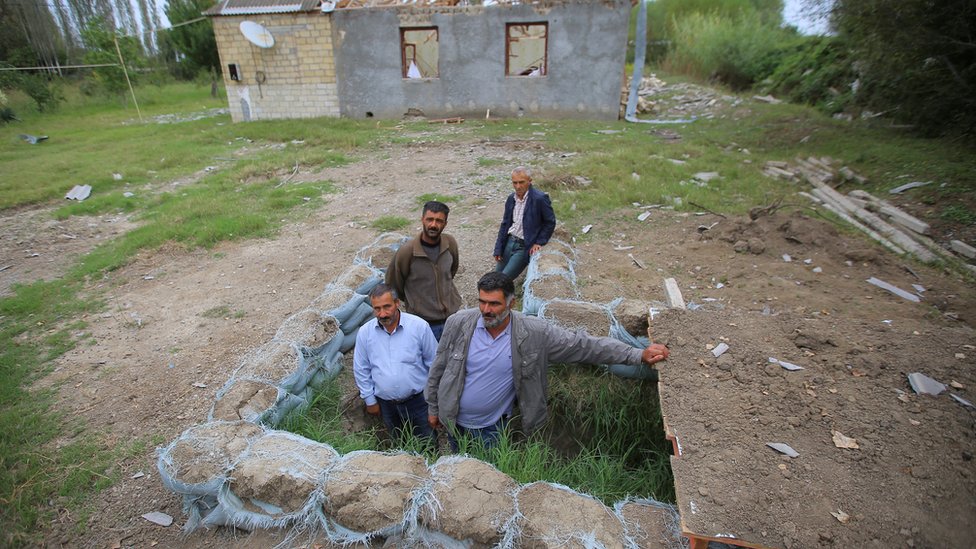By Laurence Broers
South Caucasus expert, Chatham House

Renewed hostilities have been raging between Armenian and Azerbaijani forces around the contested territory of Nagorno-Karabakh in the southern Caucasus.In scale and scope, the fighting that broke out on Sunday surpasses the periodic escalations of recent years, involving heavy artillery, tanks, missiles and drones.So far there are more than 100 confirmed deaths among civilians and Armenian combatants killed in action. Azerbaijan does not release data on its military losses, but these can be assumed to be at least as high.The fighting appears to be driven by an attempt by Azerbaijani forces to recapture swathes of territories occupied by Armenian forces in the Karabakh war after the Soviet Union collapsed. Hundreds of thousands of ethnic Azeris were displaced from these areas in 1992-4.The escalation follows a tense year – a diplomatic standoff, belligerent rhetoric and clashes in July to the north in the area of the international border between Armenia and Azerbaijan.
- What are Armenia and Azerbaijan fighting over?
- Nagorno-Karabakh: BBC visits Azerbaijan’s side of frontline
What are the dangers?
Previous escalations between Armenian and Azerbaijani forces have been contained after a few days. The intensity of the current fighting indicates that this may not be possible this time.
Populated areas within the contested territory of Nagorno-Karabakh have been hit by missile strikes and bombardments for the first time since the 1990s. Civilian targets in Armenia and in Azerbaijan have also been hit.

Both sides appear to be digging in for a longer conflict. Azerbaijan has rejected renewed negotiations with Armenia, and unlike in previous escalations it has a greater degree of Turkish support to count on. The danger is that a longer, protracted conflict will see increased involvement by outside powers, risking a wider regional war.
What is Turkey’s role?
Turkey has traditionally provided moral and diplomatic support to its fellow Turkic nation and key geo-strategic partner Azerbaijan. Contacts between defence officials of both states intensified after July’s clashes, and joint military exercises followed.Since the fighting started on Sunday, Turkey has declared its unconditional support to Azerbaijan, and appears to be lending Azerbaijani various kinds of military capability. There is little doubt that highly regarded Turkish military drone technology is being deployed.Yerevan has also accused Ankara of shooting down an Armenian SU-25 aircraft on 29 September, which Ankara denies. Although such claims have been made before and found to be untrue, there are also unconfirmed – but growing – claims that Turkey has mobilised mercenaries from Syria to fight for Azerbaijan.
What is Russia’s role?
Russia plays diverse, often contradictory, roles in the conflict. Through bilateral ties and the Collective Security Treaty Organisation, Moscow provides Armenia with security guarantees, but these do not extend to the combat zone in Nagorno-Karabakh, which is internationally recognised as part of Azerbaijan.
Moscow also supplies weapons to both sides and is one of the co-chairs of the Minsk Group mediating the conflict.Russia has called for a ceasefire, but unlike previous large-scale escalations it has yet to convene a meeting of Armenian and Azerbaijani political or military leaderships.
Moscow has an uneasy relationship with Armenia’s new post-2018 leader Nikol Pashinyan, and Yerevan would undoubtedly prefer to handle the escalation as far as possible on its own. Russia was not able in the 1990s to deploy peacekeeping forces on the ground in Nagorno-Karabakh. Armenian misgivings that Moscow’s assistance would come with strings attached drives caution in asking for Russian support.
For as long as combat is contained to contested territory in and around Nagorno-Karabakh, the optics of preserving Russian neutrality make Moscow’s overt involvement unlikely. However, a longer conflict with increasing Turkish participation would threaten Russia’s dominance in an area it considers part of its sphere of privileged interests, and invite a response.
How has the international community reacted?
With the exception of Turkey, other regional and global powers have called for restraint. Iran, Georgia and Qatar have offered to mediate. A meeting of the United Nations Security Council on 29 September affirmed the primary role of the Minsk Group, chaired by France, Russia and the United States, of the Organization for Security and Co-operation in Europe, in mediating between Armenia and Azerbaijan.
- Learn more about Nagorno-Karabakh
But concentrating sufficient international attention and commitment to renewing diplomacy will be challenging. The fighting coincides with a period of international distraction due to the global pandemic, the US elections and a traditional pattern where focus falls away once a ceasefire is agreed.
How might events play out?
Rapid and consolidated military success, either through recapture of significant territory by Azerbaijan, or the repelling of Azerbaijani operations by Armenian forces, could open up scope for a ceasefire, but trigger domestic instability in whichever side fares worse.
The longer that fighting goes on, and/or if one side is seen to be losing in a more protracted struggle, the more likely it is that Russia and Turkey will face difficult choices over whether to become more involved.
Laurence Broers is Caucasus programme director at peace-building organisation Conciliation Resources and author of Armenia and Azerbaijan: Anatomy of a Rivalry
Copied From : http://www.bbc.com
























